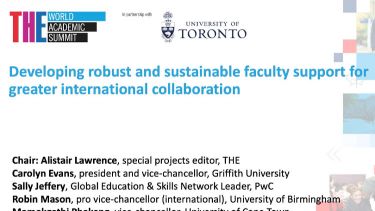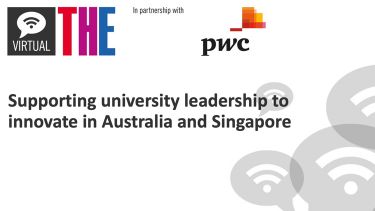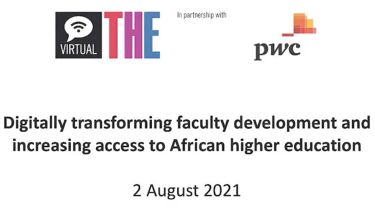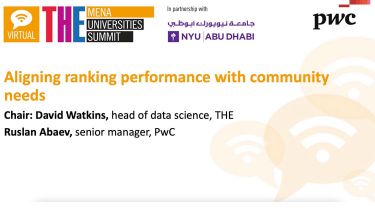A roundtable on future planning and leadership considered the opportunities and challenges of flexible and hybrid campuses
“The pandemic continues to bring challenges to the higher education sector as universities navigate multiple priorities,” said Caitroina McCusker, education lead for PwC UK, introducing the Times Higher Education roundtable on adapting university leadership for a post-pandemic future. “They’re looking at mental health issues, reimagining new student experiences, considering the people agenda, and realigning costs.” Higher education leaders have had to become comfortable with disruption; now, they must adapt to an uncertain future.
Civic mission
One of the positive outcomes of the pandemic has been the opportunity for university leaders to reflect on the core purpose and civic mission of their institutions. “The whole process has made us collectively reflective, not just institutionally. We’re more cohesive and collaborative, with professional services and students helping to shape and inform our learning systems and culture, as well as leaders,” said Professor Kiran Trehan, pro vice-chancellor for partnerships and engagement at the University of York. Universities must get better at communicating their role in the community in future, she added. “We don’t always highlight all the good work we do, for example in social mobility and the way many institutions stepped up to help the NHS [during the Covid-19 pandemic].”
This will become especially important in years to come to support students whose learning was impacted by the pandemic, pointed out Professor Robin Mason, pro vice-chancellor (international) at the University of Birmingham. Leaders will need to demonstrate the value of universities to students and their families. “We are about to encounter five-to-10 years of students’ learning that has been disrupted,” Mason said. “As universities, we need to adapt our learning and teaching so they can pick up that time that has been lost. This is a tangible way to demonstrate our value.”
Professor Nick Plant, deputy vice-chancellor for research and innovation at the University of Leeds, felt that closer working relationships with external stakeholders would help institutions show the value they add to their communities. The Nexus Innovation Centre at Leeds fosters collaboration between small businesses, the third sector and students, Plant explained.
Professor Ian Greer, vice-chancellor of Queen’s University Belfast, said university leaders must be at the centre of the debate around rebuilding the post-pandemic economy.
“We need to bring the students with us on this journey, and our role going forward will be reskilling people after the pandemic, helping people into new sectors,” he said.
Hybrid working
Getting to grips with hybrid working was one of the most immediate challenges for leaders during the pandemic. Speakers described an ongoing tension between the advantages of flexible working and ensuring it is inclusive of staff, students and the community. “Lots of students will want to see academic staff on campus, which may counter the idea of having a flexible workforce,” said Professor Simon Green, pro vice-chancellor for research at Aston University.
At the University of Exeter, academic leaders have developed a closer working relationship with professional services. “This has led to greater mutual respect that we can build on in the future,” said Professor Tim Quine, deputy vice-chancellor for education at the university. It will also impact how courses are designed and delivered. Exeter has supported leaders to adapt their own pedagogical methods, creating design principles for digital learning but retaining an institution-wide approach.
Digital transformation
University leaders must focus on the long-term digital horizon as staff and students prepare for a future where learning is blended. While the immediate focus has been on ensuring learning is accessible online, institutions now see that technology can have a role in promoting well-being and driving engagement for students and staff alike. “Novel approaches to learning are not just about systems and processes, but about creating living labs,” said Trehan.
London South Bank University has seen a 15 per cent increase in engagement with digital tools. Professor Dave Phoenix, vice-chancellor for learning at the university, said: “We can engage with technology in a much more proactive way and support people with a diverse range of needs. In some cases, it’s meant we’ve been able to deliver more because people can work remotely.”
Upskilling academic staff to cope with this changing landscape is essential. “Often, academics are left to their own devices while professional services staff receive more training. How can we invest more in our academics to support them for all the new things coming down the line?” asked Mason.
Professor Bob Nichol, pro vice-chancellor for research and innovation at the University of Portsmouth, said a programme at his institution to upskill leaders had been so successful that there are plans to roll it out across the university.
“Covid-19 has moved universities forward far more than expected,” concluded McCusker. “There will be challenges for leaders, such as addressing digital poverty, but we have a greater culture of adaptability and collaboration.” It’s time for leaders in higher education to come together, get comfortable with change and reconnect to their core purpose.
The panel:
- Simon Green, pro vice-chancellor for research, Aston University
- Ian Greer, president, Queen’s University Belfast
- Sharon Huttly, deputy vice-chancellor for academic development and performance, Nottingham Trent University
- Anna McKie, reporter, Times Higher Education (chair)
- Robin Mason, pro vice-chancellor (international), University of Birmingham
- Bob Nichol, pro vice-chancellor for research and innovation, University of Portsmouth
- David Phoenix, vice-chancellor, London South Bank University
- Nick Plant, deputy vice-chancellor for research and innovation, University of Leeds
- Tim Quinne, deputy vice-chancellor, University of Exeter
- Kiran Trehan, pro vice-chancellor, University of York
Watch the roundtable on demand above or on the THE Connect YouTube channel.
Find out more about PwC.







